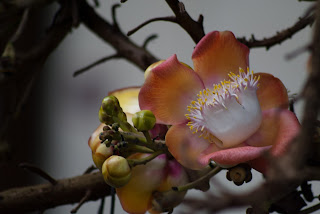I love the springs and
summers of Bangalore, they bring out the best in Bangalore. It’s like the
heavens have a special team lined up to shower flowers and leaves on me as I
drive. It amazing how trees along the various roads burst into yellow, orange, purple
and pink flowers, it’s truly a mesmerising sight.
While I loved watching
them year after year and always wanted to be photographed sitting or standing
under them I never really bothered to learn more about them. I would always be
amazed by how people I knew name trees by just looking at them, while my
knowledge didn't go beyond knowing 5 trees. After my first tree walk I could not recall more than 1 tree. I kept struggling for a while
One of the advise I
was given was to try identify the trees that were in bloom or fruiting. Since
the flowers and fruits look different it’s easier to identify them. Once you
know the names then you just have to observe them more to know other details.
This has been the best advice I have received and have started putting it to
practise. It's amazing how much you can learn just by looking at the flowers.
 |
| Cassia fistula/ Vishu Flower |
 |
| Gulmohur |
 |
| Rain Tree |
If a flower blooms during the night and the likely pollinators for the flowers are the bats. Older flowers on the same plant/tree might have different colour just so that pollinators (birds, bees and other insects) can differentiate and tell the flowers they have already visited and the ones that are fresh.
 |
| White Plumeria |
 |
| Cannon Ball. Nagalinga tree , Couroupita guianensis |
 |
| Copper Pod |
I have started to
realise that leaves differ as well. Not just in size but they have different
patterns and structures. Botany was never my strong hold and I find
understanding leaf patterns a little more difficult. When it comes to leaves
you look at the stalk and identify the nodes (slightly swollen parts on the
stalk). If there is single leaf emerging from there it’s a simple leaf
otherwise compound. The vein patterns on the leaves can tell you the kind of
tree/plant it belongs to.
 |
| Peepal Tree |
 |
| pongamia leaf |
The other thing to
look for is the bark patterns, some might be smooth while others broken and
jarred. For now I am still finding my way through the complex plant world but
the journey so far has been interesting and I realise I have just about scratched the surface there is a long way to go.
My current bible for flowering tree in Bangalore: http://www.wildwanderer.com/blog/?page_id=90
And the next link has
helped me to some extent to understand leaf patterns http://www.imarket.pt/modules/com_ninjaxplorer/simple-pinnate-leaf-88.html
For more hands on experience would suggest going for http://www.ecoedu.in/treewalk/

